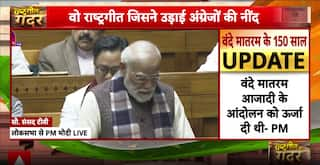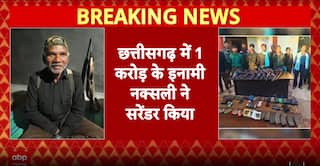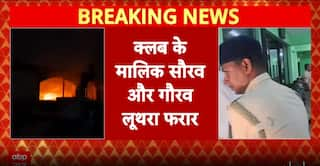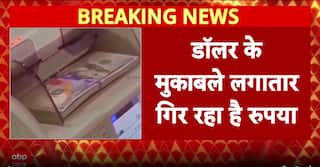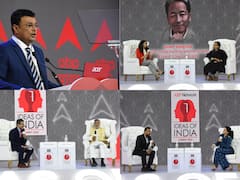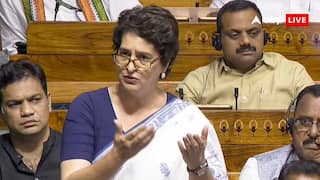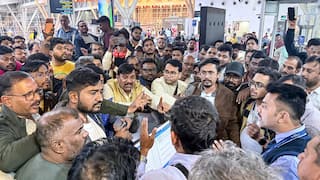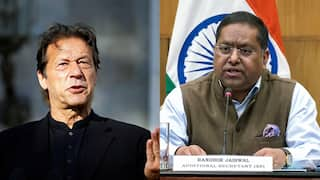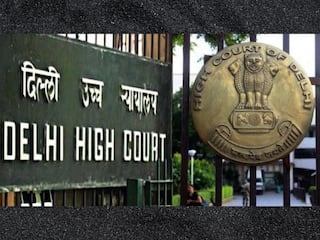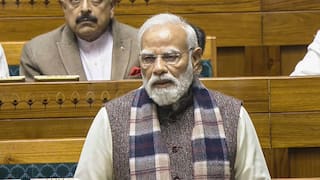ABP Ideas of India: Conducive Environment Priority For $5 Trillion Economy, Say Montek Singh Ahluwalia & Rajiv Kumar
ABP News Ideas of India, Day 2: Montek Singh Ahluwalia and Dr Rajiv Kumar discuss a range of factors regarding India's target of becoming $5 trillion economy

Mumbai: A 45-minute session on the topic, ‘The $5 Trillion Economy: Rhetoric or Reality?’, saw two noted economists, former Planning Commission of India deputy chairman Montek Singh Ahluwalia, and NITI Aayog vice chairman Dr Rajiv Kumar witnessed many diverse views, but both asserted one common point — the goal of a $5 trillion economy is not so easy to come by, given certain factors that bound the Indian economy.
On Day 2 of ABP Ideas of India summit, senior journalist and author Shankkar Aiyar, who chaired the session, asked Rajiv Kumar the pertinent question, the topic of the debate – What is the deadline for the $5 trillion economy?
Unrealistic and not a rhetoric
Kumar, while responding, categorically mentioned that the target is not unrealistic and surely not a rhetoric. However, he said, the path is not so easy to achieve. “If things remain normal, and we are not witnessing the fourth wave of a pandemic or any ghastly outcome in Ukraine then we can achieve 8 per cent growth because we have done that. If we can do it, we can achieve the doubling of the economy in about 7-8 years,” said Kumar.
“Given the fact that we know now, the uncertainties are big. Don’t know the outcome of the world when there is war going on. We already are a $2.7 billion economy. Now we have to double it at 8 per cent growth and with all conditions in place, this is achievable,” he added.
Ideas Of India | Former Deputy Chairman Of Planning Commission Montek Singh Ahluwalia Talks About India's Economic Growth@RajivKumar1 @ShankkarAiyar @panavi #MontekSinghAlhuwalia
— ABP LIVE (@abplivenews) March 26, 2022
Read More: https://t.co/U7eHpGvSpa#ABPIdeasOfIndia #OpenMinds pic.twitter.com/Ht7STsKIPM
The former economic planner, however, said the whole business of reaching an economic target is a slogan, and slogans are catchy.
“Holding the government to reaching $5 trillion by 2024 is not fair. Because the fact is you have a pandemic and lots of other things. It’s been a very unusual period. So, now let’s look at the revised audit which is $10 trillion by 2030. If you rephrase your question, is this audit feasible? The way as an economist from the outside I would address that question as what does it mean for the growth rate? Now, the Indian economy today is about $2.95 trillion. In order to reach something close to $10 trillion by 2030 and allowing an international 3 per cent inflation rate in dollar terms. It will have to grow at 11 per cent per year for nine years,” said Ahluwalia, adding that good growth is bound by certain factors globally, which impact growth.
“The economy had slowed down before the pandemic. There could be various reasons, may be demonetisation or the GST implementation. However, I am not going into those factors. The caveat being uncertainty and the world has changed too, plus the issue of climate change is also there,” he mentioned.
Reforms can lead India in achieving its target. On that note, the session chair asked about reforms in state government sectors. In his reply, Kumar said we have to shift the conversation from Delhi.
“NITI Aayog is pushing hard for this. Every state is different. We have brought out state-oriented schemes. Every state should develop its own set of reforms. NITI Aayog is engaging with the states. We have to see how to make private investment more viable in state-run units. Gujarat, UP, and Haryana are following the Centre’s guidelines in reforms,” he said.
Kumar mentioned that the government is on the right track. Air India divestment is one of them. Govt has come up with LIC IPO plus privatisation in two PSBs is also on the anvil.
According to the vice chairman of NITI Aayog, private investment is a growth driver for the economy.
Reforms in state public sectors
On the issue of power sector bailouts and reforms in labour laws, Ahluwalia said that sectors such as education, health are under domains of states constitutionally. “States have the responsibility. But most of the states are not in a position to embrace the path of reforms because of weak financial conditions. That’s why it is much easier for states to hire contractual workforce,” he pointed out.
Reforms in agri sector
During the final leg of the debate, Aiyar asked about reforms in agriculture.
Kumar said that the government is looking to start agro-ecology, which is chemical-free agriculture. “We have to start talking to the state government encouraging them to change the cropping pattern and pricing. There is a science behind this. Agriculture needs a paradigm shift.” He stressed on the point that there should be concrete coordination among the Centre and states on the issue of agriculture.
Opportunity for India
Both the panelists have approved that there is a window of opportunity for India after the Russia-Ukraine conflict as the world order might see a change in the future.
“I just hope the world doesn't break into blocks. But, yes there is an opportunity for India. The rule-based order should remain without any hegemony and the developed countries must act selflessly,” Kumar said.
Ahluwalia, however, said: “It certainly indicates that we must organise for a multi-based world order.” He added that India needs to strike a balance between the European powers and Asian powers, along with engaging with the QUAD.
ABP Network’s two-day 'Wild Stone presents Ideas of India' Summit brought thought leaders from various fields — culture, sports and cinema to technology, business and politics — to talk about the journey of India so far.










